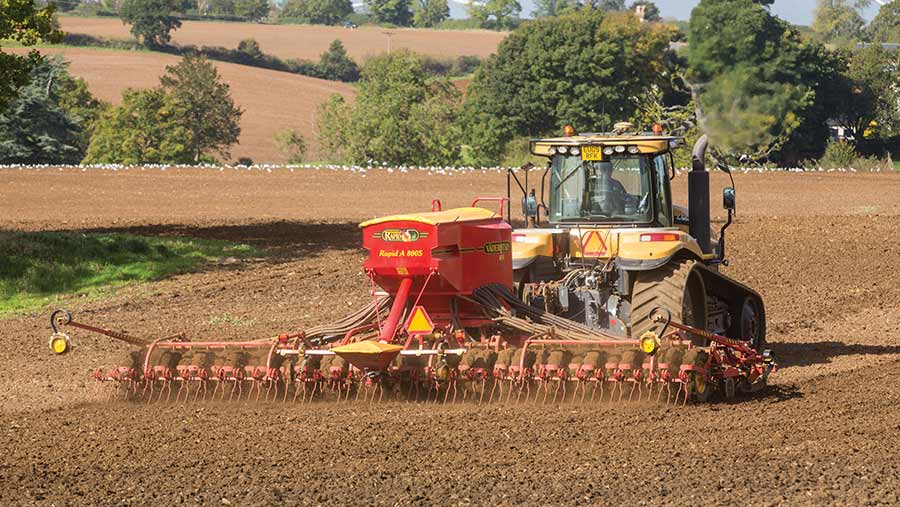Why more growers are turning to independent agronomists
 © Tim Scrivener
© Tim Scrivener Almost half of the UK’s arable land is now looked after by an independent agronomist, with that area expected to increase as Brexit takes shape and new agricultural policy is introduced.
As the farming industry braces for its biggest reform and transformation since 1945, interest in the independent advice sector has never been greater, reports the largest body of independent consultants in Europe.
See also: Why whole-field stewardship has a place in arable rotations
Sarah Cowlrick, chief executive officer at the Association of Independent Crop Consultants (AICC), highlights that Independent agronomy is now the preferred source of advice across 2.2m hectares, which is almost half of the UK’s arable land.
And demand continues to grow.
So why is demand growing for independent advice? Sean Sparling, chairman of the AICC and a working agronomist in Lincolnshire, believes it’s because the only source of income that an independent agronomist has is from the sale of their advice.
“Put simply, there are no conflicts of interest,” he says. “Our advice comes with no strings attached and no gimmicks. Farmers get a financial return from that independence.”
Driving down input costs
What this means in practice for his clients is that their variable costs are lower, but without any associated drop in yield or quality. In his experience, more targeted input regimes are achieved by AICC members when they take on a new farm, which is where they make a difference.
“Farm incomes have been under pressure for some time now and that’s only likely to intensify in 2021. Knowing when not to spend is an important part of the job,” he says.
In addition, farmers are now routinely getting together to discuss and compare their costs and business performance, which has highlighted where improvements can be made and how AICC members can drive that change.
“It has exposed where there are differences in their input costs, why that is and what they can do about it.”
Post-Brexit role
Another area under the new political landscape where independent agronomists have a key role is making their clients’ farm businesses more resilient and profitable, while also delivering environmental returns.
Profit and margins will continue to be key, regardless of whether wheat or wildflowers are the crop being grown, he points out.
Mr Sparling accepts that the role of the independent agronomist has already evolved, as the focus has moved from advising on agrochemical and fertiliser inputs towards a more integrated approach.
“As with all advisers, we’ve moved from just giving crop protection advice to giving longer-term sustainability guidance covering soils, water, crop management, markets and logistics. That reflects the opportunities and challenges that the industry has been presented with.”
What is the AICC?
- Established in 1981, the Association of Independent Crop Consultants is the largest body of independent agronomists in Europe, with a membership of 272 active agronomists.
- Bound by a strict code of conduct that stipulates that the only source of income to members comes from their commercially independent advice, AICC members represent all areas of the UK and have access to both national and regional trials and technical meetings.
- All are Basis- and Facts-registered and have professional indemnity insurance, with full membership of the organisation only being achieved after a two-year probationary period and rigorous interview process.
- Their remit depends on individual client needs, but most go beyond crop protection advice to a more integrated approach covering all facets of soil, water and crop management.
- The AICC also runs a national network of independent agronomy trials, the results of which are available exclusively to its members for their own use.
- There is an Academy for new entrants, so that succession and professional development is managed. Each Academy member works alongside an established AICC member and benefits from a full training programme, delivered in a module format, so that they gain considerable experience and knowledge in the early stages of their careers.
- Members set their own fees, with most charging for their advice on ha/year basis.
- More information and to find an independent agronomist in your area
Case study
Antony Pearce, Landsman Farming, Aylesbury
Buckinghamshire-based grower Antony Pearce uses AICC agronomist Andrew Cotton to advise on his 1,300ha of combinable crops.
Mr Pearce believes independence has a value, especially as he is not afraid to run a business which he describes as being at the “innovative end of the spectrum”.
“Andrew is good at listening to what we want to achieve at the start of the season,” he says. “That’s important, as our thought processes have changed as we try to prepare for what’s coming our way after Brexit.”
Mr Pearce also finds Mr Cotton’s knowledge and contacts very useful, as he looks for ways to improve his business without exposing it to more risk or reducing output.
“He advises both conventional and organic farms, so there are always some learnings from his wider experience that we can put into practice here and on our joint venture farms,” he says.
“I’m not tied to any one supplier or type of product with an independent agronomist, which suits how I operate,” he says.

